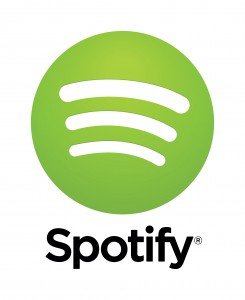Though the news naturally focuses on the swaggering accusations and courtroom drama of Apple Inc.’s (NASDAQ:AAPL) and Samsung’s latest patent brawl, where a $2.2 billion award is at stake, the Cupertino electronics titan is also engaged in a struggle for supremacy in less high profile markets. The Spotify music service, which has already come close to ousting iTunes as the number one music provider in Europe, is now challenging Apple’s position in the United States as well, helped along by a new service bundle announced yesterday by Sprint.
Sprint’s Framily plan, which offers discounts to groups of 10 or more people who sign up together, now bundles a 6 month free membership in Spotify along with its telephone plan. (“Framily,” of course, is a portmanteau of “friends” and “family.”) After the initial half year of free access, users obtain discounted access to Spotify Premium for another 1.5 years, followed by standard fees. Discounts are larger for bigger groups of subscribers ($7.99 per month for “Framilies” of 2 to 5 individuals, $4.99 per month for “Framilies” of 6 or more).
 Though Apple is still the revenue leader in Europe, Spotify’s 6 million paying users are propelling it closer to being the front runner in this large, affluent market. In light of this, British songwriter and musician Thom Yorke’s colorful quip that the service is “the last desperate fart of a dying corpse”seems somewhat refuted by reality. In the United States, Spotify occupies fourth place after iTunes Radio, commanding 6% of the market versus Apple’s 8% slice. The pact with Sprint appears to be a maneuver to close the gap and establish Spotify more firmly in one of the world’s major markets.
Though Apple is still the revenue leader in Europe, Spotify’s 6 million paying users are propelling it closer to being the front runner in this large, affluent market. In light of this, British songwriter and musician Thom Yorke’s colorful quip that the service is “the last desperate fart of a dying corpse”seems somewhat refuted by reality. In the United States, Spotify occupies fourth place after iTunes Radio, commanding 6% of the market versus Apple’s 8% slice. The pact with Sprint appears to be a maneuver to close the gap and establish Spotify more firmly in one of the world’s major markets.
Of course, Sprint itself may be an unlikely standard bearer for a successful challenger to the dominance of Apple’s iTunes in the U.S. streaming music market. The telecommunications firm is doing so poorly that investors become bullish about its stocks when its losses are less than expected, rather than for better-than-expected profits, an unknown quantity on Sprint’s balance sheets. The “Framily” ads promoting Spotify are not well regarded by consumers, either.
Nevertheless, Spotify is clearly the biggest rival to iTunes, and any gains it can make, even by piggybacking with a company that has a less-than-stellar record in the U.S., can help it catch up to its competitor. Though neither company is likely to put the other out of business, Spotify is clearly doing its best to pull ahead of Apple in the lucrative United States music market.



